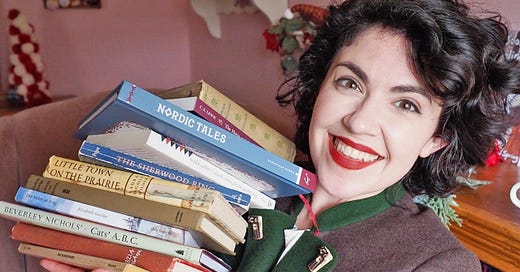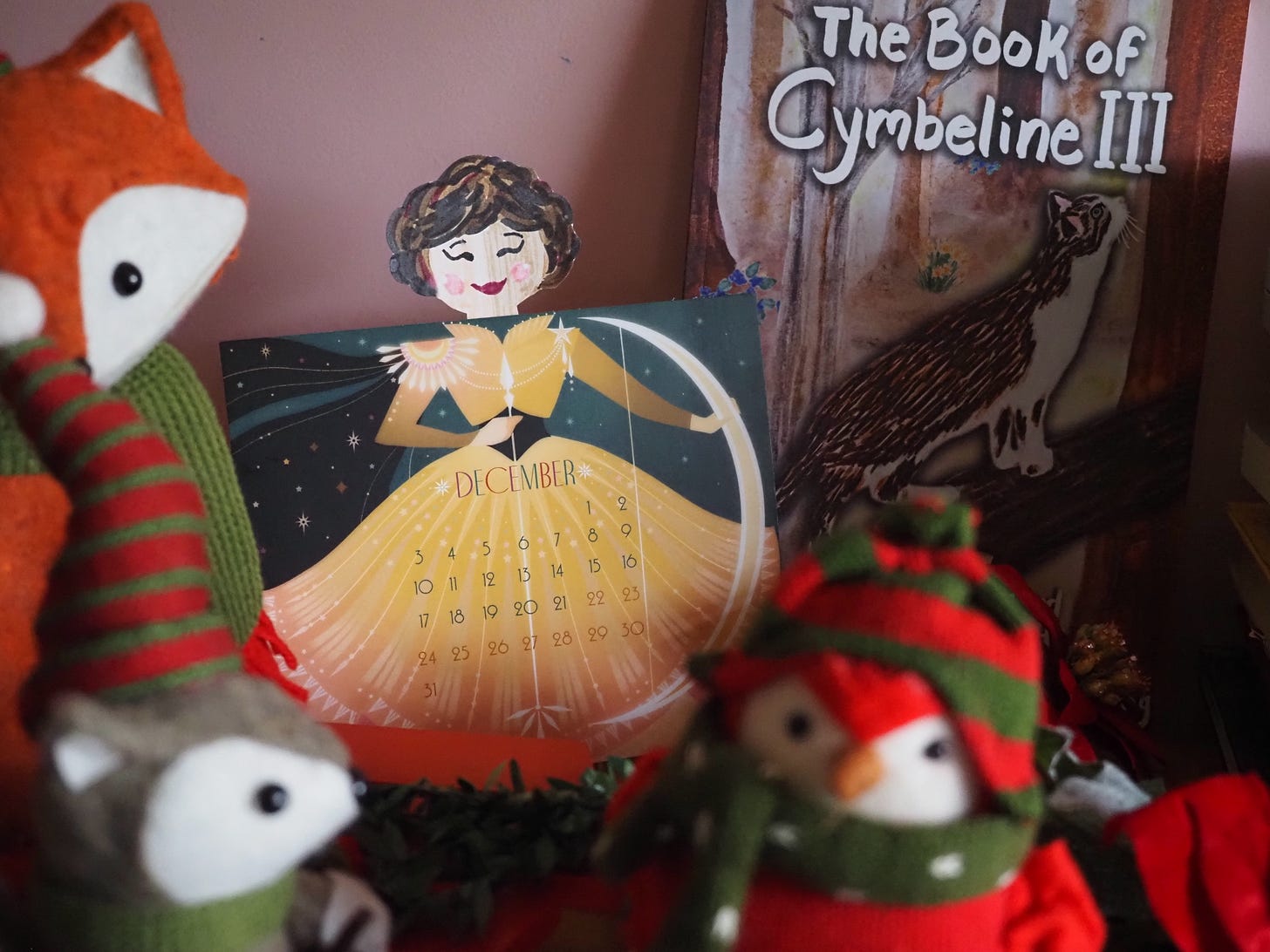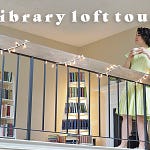There are just a few December days left to count down on the golden skirt of my last calendar girl of 2023, and that means it’s time to start counting down my top reads of the year! As promised in the video wrap-up, I’ve assembled a list of 23 beautiful quotations, one from each of my top 23 picks…
Back in January, I numbered a page in one of my notebooks from 1 to 23, and it’s been so exciting to slowly fill the lines in with the crème de la crème of titles that I’ve read and re-read throughout this year. There have been so many new and old favorites! Every December when I put together this list, I go back to find quotations to share or to refresh my memory on some specific detail in the books - and I end up getting sucked into the stories and wanting to read them all over again. 😅 When I’m chatting about the picks on camera, it can be hard to keep track of what I’ve talked about and what I’ve left out - as a matter of fact, discerning viewers of the above video may observe that I only mention 22 books, not 23. Oops - I guess we’ll just make the 23rd pick a substack exclusive!
1. The Valley of Song by Elizabeth Goudge
“Child, why are you so slow and leaden-footed, like a prisoner in bonds? If the nights are dark in the Winter solstice the star-folk glitter in the sky, and in the short days the frost-fires sparkle. You should be merry in the dark and the brief light, as they are merry.”
“I am a prisoner in bonds, roped by sins and follies. My ropes are strong as iron and I cannot get free.” …
“When you have endured the darkness of the waters, you will see your bonds lifted away from you, up to the light again, like a bright garland.”
“What can be done with them, up in the light?”
“They will make beauty.”
These quotations are listed in (roughly) chronological rather than rank order, but if I had to narrow down my top 23 to just a top 3, this Goudge children’s classic would still make the list. From the shipyard setting to the secret world packed with spiritual symbolism to the warm and cozy characters to the gentle humor to the magical way Goudge paints the zodiac signs as Christian guardians, A Valley of Song is spectacular!
2. Cats’ A.B.C. by Beverley Nichols
The problem of the cat and the mouse is one that has been argued between Fs and non-Fs since time immemorial. The non-Fs cite it as one of the reasons why they dislike cats. Whereupon, the Fs feel very uncomfortable and try to gloss over the subject with vague references to ‘Nature’.
Personally I should have thought that this was one of those problems which might reasonably be deposited, fairly and squarely, on the lap of the Almighty who — with all deference — can hardly evade all responsibility. However, before doing so, let us consider a few facts. Let us clear our minds by studying the behaviour of my own cats.
Any fellow “Fs” and cat aficionados simply *must* find a copy of this alphabet of delightful feline observations. It is eloquent, relatable, and hilarious by turns. Fun fact: I reference the above passage in The Book of Cymbeline III!
3. The Absentee by Maria Edgeworth
She had a strong mind, capable of looking steadily at truth. Surrounded as she had been from her childhood by every means of self-indulgence which wealth and flattery could bestow, she had discovered early, what few persons in her situation discover till late in life, that selfish gratifications may render us incapable of other happiness but can never, of themselves, make us happy. Despising flatterers, she had determined to make herself friends — to make them in the only possible way — by deserving them.
My only regret about The Absentee is that Maria Edgeworth didn’t write an entire sequel about Miss Nugent (the lady being described in the quotation). However, our main character Lord Colambre is also inspiring, the writing is as top-tier as you would expect from one of Jane Austen’s favorite authors, and the way the plot explores Anglo-Irish issues is fascinating.
4. The Cloud of Unknowing by Anonymous
For I tell you this: one loving, blind desire for God alone is more valuable in itself, more pleasing to God and to the saints, more beneficial to your own growth, and more helpful to your friends, both living and dead, than anything else you could do.
This book caught my eye when I was bookstore browsing one day, and when I opened it up to read just the first few pages of the invocation, I found the anonymous fourteenth century author “charging and beseeching” me in such a commanding way that I had to buy it! I co-hosted a Lenten readalong of this classic of Christian mysticism in 2023, and there were so many enriching observations on contemplation and faith. I’m so glad to have read it and to have it on my shelves to return to in the future.
5. Paradise Regained: The Tradition and the Poem by Elizabeth Marie Pope
Perhaps the seventeenth-century reader may have suspected that some of the departures from orthodoxy would have been unnecessary if Paradise Regained had been written as a tract instead of as a poem. But if he were a liberal and fair-minded critic (and Milton would not have concerned himself over any other), he would have been constrained to admit that every one of the poet’s alterations was feasible, and at the best even improved on the conventional view of the temptation by clarifying its ambiguities and bringing out all its latent possibilities to the full.
For all lovers of The Perilous Gard and The Sherwood Ring out there who wish we had more from Elizabeth Marie Pope: it’s definitely worth grabbing a used copy of this fascinating academic treatise to get a taste of Pope in full-on scholarly mode. Don’t forget to have a copy of Milton’s Paradise Regained on hand too!
6. The Borrowers by Mary Norton
Mrs. May lived in two rooms in Kate’s parents’ house in London; she was, I think, some kind of relation. Her bedroom was on the first floor, and her sitting room was a room which, as part of the house, was called “the breakfast-room.” Now breakfast-rooms are all right in the morning when the sun streams in on the toast and marmalade, but by afternoon they seem to vanish a little and to fill with a strange silvery light, their own twilight; there is a kind of sadness in them then, but as a child it was a sadness Kate liked. She would creep in to Mrs. May just before tea-time and Mrs. May would teach her to crochet.
If you love miniature things and creative dollhouse-sized contrivances, you will inevitably fall in love with The Borrowers. The backdrop of a faded Victorian household adds both pathos and magic to the tale of the clever Clock family and the irrepressible Arrietty.
7. Pilgrim’s Progress by John Bunyan
Now, a little before it was day, good Christian, as one half amazed, brake out into this earnest speech: "What a fool," quoth he, "am I to lie in a foul-smelling dungeon, when I may as well walk at liberty! I have a key in my bosom called Promise, that will, I am sure, open any lock in Doubting Castle." Then said Hopeful, "That is good news, good brother: pluck it out of thy bosom, and try."
This is the “secret” 23rd substack pick - I have no idea how I left it out of the video! This is a classic that is referenced by so many other classics, and reading and listening to it (I really enjoyed the free Libravox audiobook), I could easily see why. The simple but beautiful allegory is so inspiring - the Doubting Castle scene was one of my favorites. Sometimes we forget, but that key called Promise is always in each of our pockets.
8. Manalive by G.K. Chesterton
What (the undersigned persons ask themselves) is a puddle? A puddle repeats infinity, and is full of light; nevertheless, if analyzed objectively, a puddle is a piece of dirty water spread very thin on mud. The two great historic universities of England have all this large and level and reflective brilliance. Nevertheless, or, rather, on the other hand, they are puddles--puddles, puddles, puddles, puddles. The undersigned persons ask you to excuse an emphasis inseparable from strong conviction…
Such were the thoughts that failed to cross the mind of the undergraduate Smith as he picked his way among the stripes of canal and the glittering rainy gutters into which the water broke up round the back of Brakespeare College. Had these thoughts crossed his mind he would have been much happier than he was. Unfortunately he did not know that his puzzles were puddles. He did not know that the academic mind reflects infinity and is full of light by the simple process of being shallow and standing still. In his case, therefore, there was something solemn, and even evil about the infinity implied. It was half-way through a starry night of bewildering brilliancy; stars were both above and below. To young Smith's sullen fancy the skies below seemed even hollower than the skies above; he had a horrible idea that if he counted the stars he would find one too many in the pool.
I need to go back and reread The Poet and the Lunatics to decide if Manalive should now rank as my #1 favorite work of Chesterton fiction - it’s certainly a close call, they’re both excellent. I couldn’t stop marking passages as I read Manalive - it is so brilliant and quirky and thought-provoking!
9. The Sherwood Ring by Elizabeth Marie Pope
I’m like my uncle — remarkably set on having my own way. So were all the other Sherwoods, as far back as the family history goes. We even have a motto about it on our coat-of-arms: Quod desidero obtineo which roughly translated from the Latin, means: I get what I want.
I was about to write that this book has one of my favorite literary heroes - Peaceable Drummond Sherwood - but then I remembered that Peaceable could technically be considered the villain! I’ve reread this book so many times, and it was wonderful to discuss with bookish friends at a colonial meet up this spring.
10. Death Comes for the Archbishop by Willa Cather
One felt that his training, whatever it had been, had prepared him to meet any situation which might confront him. He was as much at home in the Bishop’s study as in his own pueblo — and he was never too much at home anywhere.
Willa Cather has been slowly growing on me as an author - Shadows on the Rock has long been a favorite, The Lost Lady claimed a spot on my top reads of 2022 list, and I thoroughly enjoyed the writing and the reflections and the vivid historical, cultural, and geographical setting of Death Comes for the Archbishop. I have a copy of The Song of the Lark which I haven’t read yet…we’ll have to see if that makes it onto the 2024 list!
11. Journey to the River Sea by Eva Ibbotson
Miss Minton had been poor all her life. She had no trinkets, no personal possessions; her employers underpaid her when they paid her at all — but her trunk was an Aladdin’s cave. There were travel books and fairy tales, novels and dictionaries and collections of poetry…
‘How did you get them all?’ Maia asked wonderingly. ‘How did you manage?’
Miss Minton shrugged.
‘If you want something enough you usually get it. But you have to take what goes with it,’ — and she pointed to her shabby blouse and mended skirt. ‘Now, let’s see — what shall we start with? Ah yes, here is Bates — he must have sailed down this very river not sixty years ago. Look at that drawing of a sloth…’
I always enjoy a good Eva Ibbotson, and while the stunning scenery of the Amazon “River Sea” and the intriguing British family mystery drew me into this book, it was Miss Minton who put it over the top as a favorite!
12. Sense and Sensibility by Jane Austen
She was stronger alone, and her own good sense so well supported her, that her firmness was as unshaken, her appearance of cheerfulness as invariable, as with regrets so poignant and so fresh, it was possible for them to be.
Dear Jane never disappoints, and Elinor’s solid good sense and clarity of vision is so inspiring. I loved spending time with the Dashwoods this summer!
13. Personal Recollections of Joan of Arc by Mark Twain
I was reared in the same village with her. I played with her every day, when we were little children together, just as you play with your mates. Now that we perceive how great she was, now that her name fills the whole world, it seems strange that what I am saying is true; for it is as if a perishable paltry candle should speak of the eternal sun riding in the heavens and say, ‘He was gossip and housemate to me when we were candles together.’ And yet it is true, just as I say.
Mark Twain’s reverence for the Maid of Orleans is beautiful to see, and he wonderfully weaves his own personality and trademark sense of humor into the tale of the life of this great saint.
14. Little Town on the Prairie by Laura Ingalls Wilder
“He’d rather lose with what he’s got than win with a borrowed buggy.”
“Too bad he don’t own a buggy,” Mr. Boast said.
The brown horses were by far the most beautiful on the track, and so proud. They did not seem to mind the heavy wagon at all, but tossed their heads, pricked their ears, and lifted their feet as if the ground were not quite good enough for them to step on.
Can’t you just picture those horses prancing? Laura Ingalls Wilder brings her childhood memories to life so evocatively and powerfully through the Little House on the Prairie series. And Almanzo Wilder in that race scene…swoon!
15. Christy by Catherine Marshall
The airy snowflakes, as big as goose feathers, were slackening off now. Still I could see nothing but mountains and more mountains, peak piled on peak, shrouded in whiteness. There was a feeling of vastness that went on and on into the infinity of that somber January sky, with wisps of clouds trailing off the tallest peaks, streaking here and there like banners into the gray sky.
I waffled about including this on the list, because I had some issues with it and in fact skimmed the last third/quarter of the book to force myself to finish it. However, the beautiful descriptions of the Great Smoky Mountains and the insightful observations about faith have continued to come to mind in the months since I finished it. It’s definitely worth a read — and the fact that I kept thinking of Marshall’s writing as I visited Tennessee earlier this year also made me feel I had to include it on the 2023 list!
16. The Horse and His Boy by C.S. Lewis
“Child,” said the Voice, “I am telling you your story, not hers. I tell no one any story but his own.”
“Who are you?” asked Shasta.
“Myself,” said the Voice, very deep and low so that the earth shook: and again “Myself,” loud and clear and gay: and then the third time “Myself,” whispered so softly you could hardly hear it, and yet it seemed to come from all round you as if the leaves rustled with it.
Reading the full Chronicles of Narnia series for the first time this year has been an absolute treat. So many different lines have lingered in my memory, like Lucy waiting in the woods in Prince Caspian and the notion that Shasta learns here, that no one hears any story but their own.
17. The Picture of Dorian Gray by Oscar Wilde
She was conversing in that intensely earnest manner which is the one unpardonable error, as he remarked once himself, that all really good people fall into, and from which none of them ever quite escape.
Being overly earnest or serious is certainly not a mistake Lord Henry, who makes the above observation, would make! It’s so ironic that Lord Henry is so pithy and quotable because he’s utterly unreliable, a fact which The Picture of Dorian Gray doesn’t let you overlook.
18. The Pillars of the House; Or, Under Wode, Under Rode by Charlotte Mary Yonge
Cherry was in that world of joy and something like inspiration known to spirits imbued with any of the constructive poetry of art, always endeavoring to fulfill an ideal, never indeed satisfying themselves, but never so at rest as in the effort.
That hypothetical top 3 out of the 23 that I mentioned earlier? Charlotte Mary Yonge absolutely snags a spot next to Goudge! Yonge is a complete kindred spirit: her writing has a light, deft touch but also goes deep. Her characters seem to leap off the page and pull up a seat next to you! She details so many charming, funny, and relatable commonplace moments, but she also grapples authentically with grief, loneliness, sin, and faith in such a stunning way. I can’t wait to read more CMY in 2024!
Tree and Leaf by J.R.R. Tolkien
Most good ‘fairy-stories’ are about the aventures of men in the Perilous Realm or upon its shadowy marches. Naturally so; for if elves are true, and really exist independenlty of our tales about them, then this also is certainly true: elves are not primarily concerned with us, nor we with them. Our fates are sundered, and our paths seldom meet. Even upon the borders of Faerie we encounter them only at some chance crossing of the ways.
Considering how much I love “Leaf by Niggle” and “Mythopoeia,” I’m not sure how it is that I never before picked up this collection and read its titular nonfiction essay “Tree and Leaf.” Here Tolkien unsheathes his scholarly sword and carefully cuts out what a fairytale truly is - and what it isn’t - and also, incidentally, what is the highest aim of human works of fairy tale telling and sub-creation. His philosophy speaks so strongly to my own faith and work as a writer and video (sub-)creator. I won’t leave you in suspense as to which of these books claims the final spot on the 2023 top 3 podium: it’s Tree and Leaf!
Nordic Tales: Folktales from Norway, Sweden, Finland, Iceland, and Denmark Illustrated by Ulla Thynell
“When they got there, the west wind asked his brother if he could tell the way to that castle which lay east of the sun and west of the moon. His companion was the one who should have had the prince who lived there - “Oh, indeed!” said the south wind, “is that she? Well I have been to many a nook and corner in my time, but so far I have never blown. But if you like, I’ll go with you to my brother, the north wind; he is the oldest and strongest of all of us, and if he doesn’t know where it is you will never be able to find any one who can tell you.”
The wisdom in these stories is conveyed so artistically and unexpectedly! It’s safe to say Tolkien got me started on a fairytale kick, and this gorgeous Chronicle Books collection was a marvelous introduction to tales from Scandinavia - many of which put me in mind of Lord of the Rings.
A Christmas Carol by Charles Dickens
“Spirit! are they yours?” Scrooge could say no more.
“They are Man’s,” said the Spirit, looking down upon them. “And they cling to me, appealing from their fathers. This boy is Ignorance. This girl is Want. Beware them both, and all of their degree, but most of all beware this boy, for on his brow I see that written which is Doom, unless the writing be erased. Deny it!” cried the Spirit, stretching out its hand towards the city. “Slander those who tell it ye! Admit it for your factious purposes, and make it worse. And bide the end!”
This is the passage I mentioned in the video wrap-up! It puts me in mind of so many areas of modern dialogue, in which open discussion seems to get shut down or forbidden, those who dare to suggest a way of thinking that’s not approved by the mainstream narrative are slandered, and an elaborately-contrived ignorance, dressed up by “fact-checking” experts, is encouraged and even enforced. But no amount of clever rhetoric or willful self-deception can disguise the truth: it’s always staring up at us as the child stares up at Scrooge. Classics like A Christmas Carol endure because they remind us to always seek to look truth in the face.
“He That Should Come” by Dorothy Sayers
Strangely are we met, Wisdom, Justice, and Service,
Following the Star, seeking we know not what.
Over the past few years, some of my fellow booktubers and I have started a tradition of hosting Advent and Lenten readalongs that I’m excited to see continue! This nativity play by the wonderful Dorothy Sayers has been the perfect read in the lead-up to Christmas. I can’t decide which part is my favorite: the poetic opening with the three kings, personified by wisdom, justice, and service, or the main body of the play, which looks at the conversations and arguments and speculations happening in the crowded courtyard of the inn, while the Messiah is being born in the next-door stable.
The Book of Cymbeline III: A Kitten’s Tale from Winter to Spring by Emma Stewart
The privilege of loving and caring for a fellow creature always comes with attendant fears and worries, which even time and experience cannot fully remove. Even as month after month proved that Cymbeline was perfectly competent and safe during her solo expeditions, Emma’s anxiety was never wholly dispelled or her imagination wholly at rest, because of course the possibility of danger never wholly disappeared.
But Emma picked up her anxiety and carried it, and, measured against the utter fulfillment anyone could read in Cymbeline’s face and bearing as the little cat chased butterflies and melted into flower banks and inherited her kingdom, it seemed a light burden.
As the young lady pondered this philosophy, she suddenly felt soft fur rubbing against her leg.
“There you are!” Emma said in relief, scooping the little cat up into her arms. “You clever kitt, sneaking up on me when I was looking for you. You’re such a big kitten now, Cymbeline. I’m so proud of you.”
“I’m proud of you too, Big Cat,” Cymbeline purred. “Now where’s my dinner?”
2023 was an exciting reading and writing year - I published two more installments in my kitten series, The Book of Cymbeline. The third book, which takes us from winter to spring in the life of a small but fearless feline, might be my favorite yet! Thank you so much to all of you who have picked up a copy of the book and supported the series. I’m looking forward to finishing out the kitten’s first year in part four next year.
Like any year, 2023 had its share of difficulties and dragons to face, but looking back I see so much grace - and so many good books which came to hand at just the right moment. God is so good! Here’s to more wonderful books and more opportunities to seek His grace and sing His glory in 2024.
















Share this post